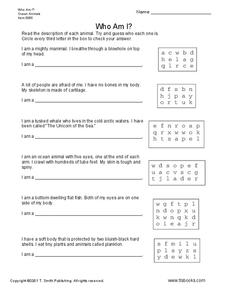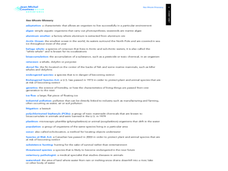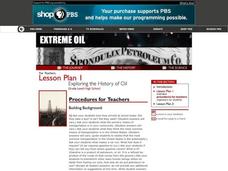Curated OER
The Future of the Arctic National Wildlife Refuge
Students research the governments role is preserving the Arctic National Wildlife Refuge. They discuss the proponents and the opponents side of the issue.
Curated OER
Buried in Ice: The Mystery of a Lost Arctic Expedition
Students read a novel about a lost arctic expedition by Sir John Franklin. In groups, they discuss the author's quest to determine what happened to Franklin and his crew. Using the internet, they compare and contrast the expeditions by...
Curated OER
The Siberian Arctic
Students, in groups, research the topics: habitats of northwestern Siberia, reindeer, oil and natural gas, and other threatened regions of the Arctic. They answer specific research questions based on their topic. They use online...
Polar Trec
Recess at 25 Below
Is there any difference between the ways a child from the polar region gets ready for recess, and the way a child from a tropical region gets ready for recess? Youngsters use a checklist to dress their Arctic Barbie and Polar Bob dolls...
Curated OER
African Country Report
Sixth graders describe the relationship between the people of Africa and their environment. They examine the climate, economy and inhabitants of this land. Using maps graphic organizers and writing a report, 6th graders demonstrate how...
Curated OER
Who Am I?
For this earth science worksheet, students read the description of each animal and identify who each one is. They circle every third letter in the box to the right to check their answer.
NOAA
Please Pass the Salt
Salinity is the focus of two experimenters that work to answer the question, How does salt change the physical properties of water? Super scientists compare the freezing rate of salt and fresh water, combine the two waters to observe how...
Curated OER
Inuksuk Stone Statues
Students examine how people in the arctic communicate with one another with stones. Using the internet, they determine the meanings of the various stone sculptures. To end the lesson, they make their own saying out of recycled material.
Curated OER
Beluga Balancing Act
Students study beluga whale populations and the issues they face. In this beluga lesson students compare the issues that the whales are facing and name ways people can help.
Curated OER
Exploring the History of Oil
Students explore the history of the oil industry. In this history of oil lesson, students reseach the history and current state of the oil industry. Students then determine whether they support the move of the oil industry into Alaska's...
Curated OER
Rate of Decomposition
Pupils experiment with the decomposition rate of garbage. They discover that environments are fragile and need to be protected and resources are not always used wisely. They then think about their own environment and then about the...
Curated OER
Some Like It Cold
Sixth graders study Canada's northern territories and four settlements above the Arctic Circle. In this northern Canada lesson, 6th graders maps and timelines to locate physical, political, and economic features of northern Canada....
Curated OER
Our Special Planet Earth
Students explore what is special about our planet. They explore the various climates that are found on the planet Earth. Students create an advertisement to convince people why their favorite environment would be the best place to visit.
Curated OER
Canadian Crossword
In this crossword puzzle worksheet, students read 8 clues about Canadian locations on the map and the culture of Canadian people. This would be difficult for U.S. students, as there is no word bank.
Curated OER
Changing Weather: Comparing Climate from Voyageur Times to Today
Fifth graders compare climates. In this weather lesson, 5th graders observe and record weather observations and discuss the impact of weather on people. Students also discuss the concept of global warming and determine how weather...
Curated OER
Born to be Wild
Students watch an episode depicting the human vs. polar bear conflict in Churchill, Canada. They conduct online research and analyze the information. They interpret the facts and use storytelling techniques and role playing to convey...
Curated OER
Fitting In-Animals' Adaptations to Their Environment
In this animals' adaptation to their environment learning exercise, students read for comprehension and ability to apply knowledge. In this T-Chart and creative activities learning exercise, students answer three questions.
Curated OER
Nunavut Challenge
In this geography worksheet, students explore the Inuit and where they live. Students complete ten multiple choice questions about Nunavut and the Inuits.
Curated OER
Polar Bear Adaptations
Students explore the adaptations that are made by polar bears. They discuss the color of polar bears as well as the dominant color that is found in the arctic. Students create a polar bear puppet.
Agriculture in the Classroom
Farmland: GMOs and Organic Agriculture
Learn more about genetic modification, organic farming, and the role of biotechnology in agriculture by watching a documentary that shows how newly gained knowledge can be applied to specific situations involving farmers and the choices...
Curated OER
Exploring Biomes
In this biology worksheet, students watch a movie about various land biomes. Then they use the word list to the right to complete each of the statements. Students also complete the brief quiz about the movie that follows.
Curated OER
Build Your Own Greenhouse
Students study how to protect themselves and their things from the harsh Arctic weather by making a small greenhouse and testing its effects on temperature change. They discover the change in temperature between a thermometer inside the...
Curated OER
Traditional Inuit Games
Students explore Inuit culture. In this cultural diversity lesson, students collaborate to learn Inuit games and teach them to their classmates.
Curated OER
Endangered Species: Report Planner
In this science related learning exercise, learners write three things they would like to learn about an endangered species and then list the resources they plan on using to secure the answers to their three facts.

























